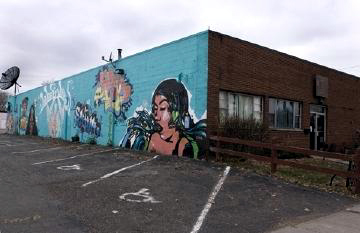Difference between revisions of "Pi Bar"
(New page: The most recent new bar for queer women in the Twin Cities followed in the footsteps of earlier social spaces: Foxy's Bar, Ladies Night, Amelia's on University, and Lucy's,...) |
(table) |
||
| Line 1: | Line 1: | ||
| − | The most recent new bar for queer women in the Twin Cities followed in the footsteps of earlier social | + | <div style="text-align: center;"> |
| + | '''2532 25th Avenue South, Minneapolis, MN''' | ||
| + | </div> | ||
| + | |||
| + | |||
| + | |||
| + | |||
| + | {| {{prettytable}} | ||
| + | ! | ||
| + | ! | ||
| + | |- | ||
| + | | The most recent new bar for queer women in the Twin Cities followed in the footsteps of earlier social spaces—[[Foxy's Bar]], [[Ladies Night]], [[Amelia's on University]], and [[Lucy's]]—but it also set out into uncharted territory. By all accounts, Pi Bar was the first bar/restaurant that exclusively catered to queer women in Minneapolis. | ||
| + | |||
| + | |||
| + | That is not to suggest that queer women were absent from Minneapolis' social scene before; The [[Lesbian Resource Center]], [[A Woman's Coffeehouse]], the [[Amazon Feminist/True Colors Bookstore]], and [[Minneapolis Warehouse Parties]] are among the social spaces that women frequented before “Pi” opened in February of 2007. | ||
| + | | [[Image:Pi_Bar.jpg]] <div style="text-align: center;"> | ||
| + | <small>'''Pi Bar shortly before closing in 2008. Courtesy of the Twin Cities Daily Planet: http://www.tcdailyplanet.net/article/2008/11/09/pi-bar.html'''</small> | ||
| + | </div> | ||
| + | |} | ||
| + | |||
| + | |||
| + | These earlier organizations similarly offered social space as a response to the absence of nightlife options in Minneapolis—liquor-based establishments in Minneapolis continue a pattern that began with anti-prostitution ordinances in the Gateway District (see: [[The Dugout Bar]]). With few Minneapolis business models to follow, owner Tara Yule implemented the successful techniques of St. Paul’s old “lesbian” bars; she invited community organizations to use her space, and she welcomed a diverse clientele to the bar’s pool tables, nightly events, and spacious dance floor. | ||
| + | |||
| + | |||
| + | Unfortunately, Pi’s borderland location between the Seward and Longfellow neighborhoods proved difficult to reach—the bar’s clientele could not reach the venue easily by public transportation. Located in a concentration of light industrial buildings, the bar was not supported by a coexisting residential community. Previous spaces for queer women used residential settlements as a primary business support—this was the case for the Lesbian Resource Center near Loring Park, and the Amazon/True Colors Bookstore near Powderhorn Park. | ||
| + | |||
| + | |||
| + | The establishment also opened in one of the unluckiest business eras since the late 1920s—Yule could not refinance payments on her $600,000 loan. Despite a community effort that raised $100,000, Pi closed in November of 2008. | ||
| + | |||
| + | |||
| + | |||
| + | ---- | ||
| + | |||
| + | |||
| + | Part of [[Minneapolis/St. Paul, MN: 100 Queer Places in Minnesota History, (1860-1969), (1969-2010)]] | ||
Revision as of 15:50, 9 March 2010
2532 25th Avenue South, Minneapolis, MN
| The most recent new bar for queer women in the Twin Cities followed in the footsteps of earlier social spaces—Foxy's Bar, Ladies Night, Amelia's on University, and Lucy's—but it also set out into uncharted territory. By all accounts, Pi Bar was the first bar/restaurant that exclusively catered to queer women in Minneapolis.
|
 Pi Bar shortly before closing in 2008. Courtesy of the Twin Cities Daily Planet: http://www.tcdailyplanet.net/article/2008/11/09/pi-bar.html |
These earlier organizations similarly offered social space as a response to the absence of nightlife options in Minneapolis—liquor-based establishments in Minneapolis continue a pattern that began with anti-prostitution ordinances in the Gateway District (see: The Dugout Bar). With few Minneapolis business models to follow, owner Tara Yule implemented the successful techniques of St. Paul’s old “lesbian” bars; she invited community organizations to use her space, and she welcomed a diverse clientele to the bar’s pool tables, nightly events, and spacious dance floor.
Unfortunately, Pi’s borderland location between the Seward and Longfellow neighborhoods proved difficult to reach—the bar’s clientele could not reach the venue easily by public transportation. Located in a concentration of light industrial buildings, the bar was not supported by a coexisting residential community. Previous spaces for queer women used residential settlements as a primary business support—this was the case for the Lesbian Resource Center near Loring Park, and the Amazon/True Colors Bookstore near Powderhorn Park.
The establishment also opened in one of the unluckiest business eras since the late 1920s—Yule could not refinance payments on her $600,000 loan. Despite a community effort that raised $100,000, Pi closed in November of 2008.
Part of Minneapolis/St. Paul, MN: 100 Queer Places in Minnesota History, (1860-1969), (1969-2010)